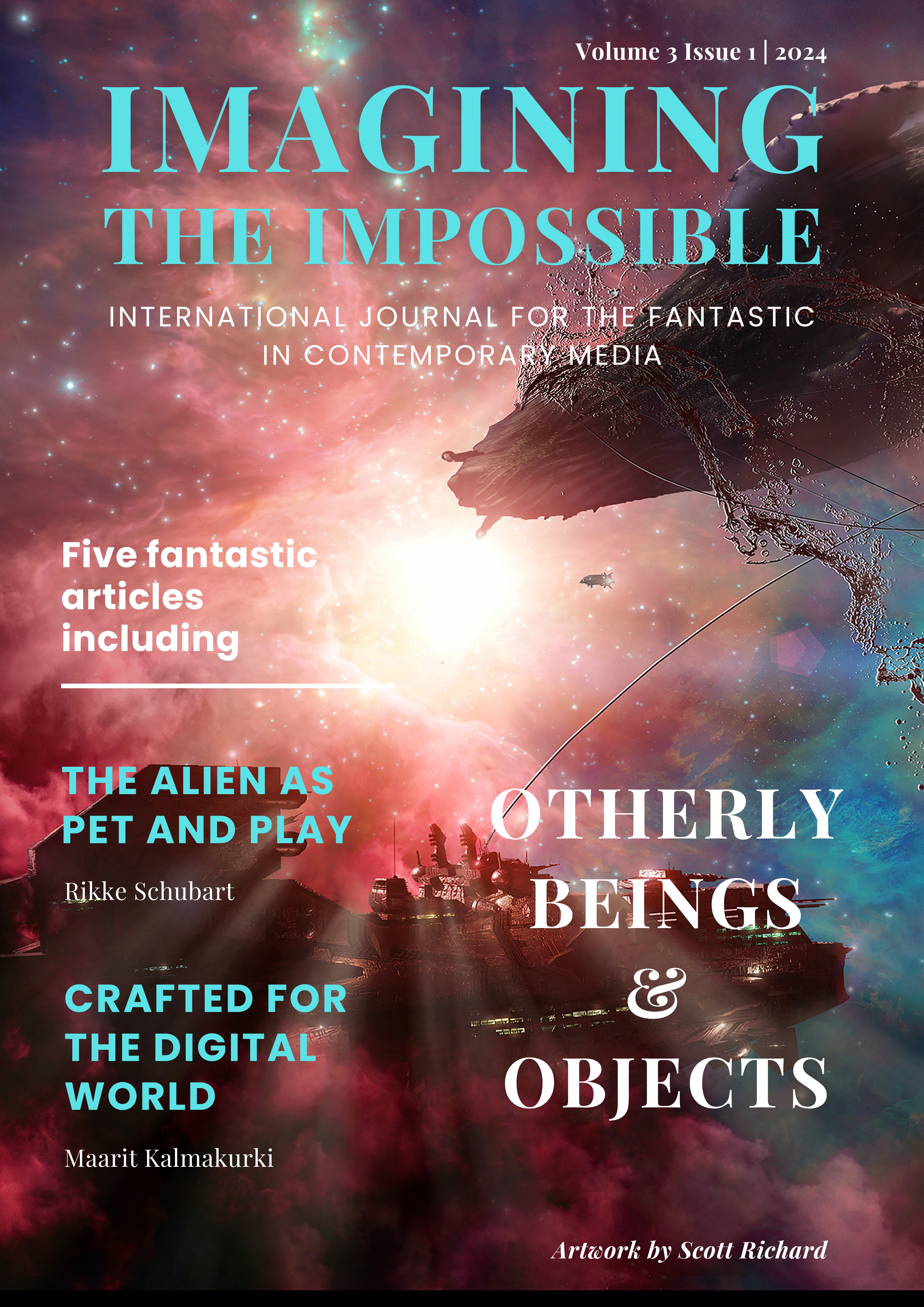The Fathomless Ocean of Objectivity, Death, and Memory
An OOO reading of the Solaris Ocean in Stanislaw Lem's Solaris
DOI:
https://doi.org/10.7146/imaginingtheimpossible.141813Keywords:
Solaris, Stanislaw Lem, Otherness, Object Oriented Ontology, PsychoanalysisAbstract
Stanislaw Lem's 1961 sci-fi classic Solaris features one of the most enduring, strange, and seemingly inexhaustible presentments of the concept of an ocean. Lem’s economy of craft resonantly renders the premise of the text on the idea that there are inescapable ontological gaps between objects encountering one another. Using immense detail, and a scientific, specifically historiographic, naturalist, and philosophical style of prose, Lem frames this idea as the complete failure of human beings to understand an extraterrestrial intelligence. The narrative follows a team of terrestrial scientists as they attempt to probe, examine, and communicate with the oceanic surface of the planet Solaris from a research station hovering above it. Based on years of research and study, the Solarists deduce that the planet, through its oceanic membrane, can somehow manifest the ability to (re)produce human secrets and guilt into material form. That form, which physically appears on the station and confronts its crew, is dependent on the specific consciousnesses of each scientist aboard. The research of the Solarists also reveals that any human attempt to formalize and concretize the phenomenological occurrences of the ocean that 'make sense' always fail. For Lem, “[t]he peculiarity of those phenomena seems to suggest that we observe a kind of rational activity, but the meaning of this seemingly rational activity of the Solarian ocean is beyond the reach of human beings” (Lem 1989).
As a type of 'memory-machine', Lem's ocean seems to act as some kind of psycho-emotional repository in which and from which various psycho-emotional affects are repressed, restored, and reproduced. Because of the radical indeterminacy of human understandings of the ocean, it is difficult if not impossible to say “why” the Solaris ocean does what it does, to attribute to its processes anything intentional, or to ascribe any anthropocentric teleology or technology to its phenomena and processes. While critics have applied numerous, and typically psychoanalytically-informed readings of the Solaris ocean, such a move subjectivizes the ocean at the expense of the seemingly inexhaustible and interesting aspects of its objectivity (its status as an object). An object oriented approach allows us to better tease these out, and open up the depths of alienness and familiarity that, while ostensibly akin to the psycho-emotional trenches of the human unconscious, are externalized in the form of a truly strange object which in turn (re)produces truly strange objects.
In view of the above, this paper seeks to accomplish the following: 1) to assert that an object oriented approach will offer better footing from which to prosecute any reading concerning the Solaris ocean's relationship with trauma and opportunity, (re)exposure, and healing; 2) offer a Post-romantic, object oriented analysis of Lem's well-crafted, detailed representation of radical alienness through the paradoxically concrete, albeit also radically indeterminate, image of an ocean-like entity/superstructure/hyperobject/space; 3) explore the encounters between the oceanic space with both human actors and the technology that mediates said interaction.
References
Csicsery-Ronay Jr., Istvan. 1985. “The Book is the Alien: On Certain and Uncertain Readings of Lem's Solaris” in Science-Fiction Studies 12.1: 6-21.
Csicsery-Ronay Jr., Istvan. 2007. "Some Things We Know about Aliens." The Yearbook of English Studies 37.2: 1-23.
Czapliński, Przemysław, and Thomas Anessi. Chaosmos. 2023. “Stanisław Lem's Solaris and Polish Post-
Avant-Garde Prose.” The Polish Review 68.2: 46–64.
Derrida, Jacques. 2016. Of Grammatology. trans. Giyatri Chakravorty Spivak. Baltimore: Johns Hopkins University Press.
Eddington, Arthur S. 1929. The Nature of the Physical World. New York: MacMillan.
Freedman, Carl. 2013. Critical Theory and Science Fiction. Middleton: Wesleyan.
Freitas Jr., Robert A. 1979. Xenology: An Introduction to the Scientific Study of Extraterrestrial Life, Intelligence, and Civilization. Sacramento, California.
Gomel, Elana. 2004. “Gods Like Men: Soviet Science Fiction and the Utopian Self.” Science-Fiction
Studies 31.3: 358–78.
Grob, Thomas. 2014. “Into the Void: Philosophical Fantasy and Fantastic Philosophy in the Works of
Stanislaw Lem and the Strugatskii Brothers.” Soviet Space Culture, eds. Eva Maurer et al. London:
Palgrave.
Harman, Graham. 2013. “The Third Table.” Documenta: 100 Notes, 100 Thoughts, ed. Katrin
Sauerländer. Ostfildern: Hatje Cantz.
Harman, Graham. 2002. Tool-Being: Heidegger and the Metaphysics of Objects. Open Court.
Harman, Graham. 2019. "Editorial Introduction for the Topical Issue “Object-Oriented Ontology and Its Critics”" Open
Philosophy 2.1 592-598.
Harman, Graham. 2018. Speculative realism: an introduction. Medford, MA: Polity.
Huss, Joanna Trzeciak. 2023. “In Stanisław Lem's Orbit.” The Polish Review 68 (2): 3–13.
Jameson, Fredric. 2005. Archaeologies of the Future: The Desire Called Utopia and Other Science Fictions
London: Verso.
Kajtoch, Wojciech. 2002. “Introduction to Solaris (of Stanislaw Lem).” Translated by Lech Keller.
Klapcsik, Sandor. 2012. Liminality in Fantastic Fiction: A Poststructuralist Approach. London: McFarland.
Lacan, Jacques. 1980. Écrits. London: Tavistock.
Lem, Stanislaw. 1970. Solaris. Trans. Joanna Kilmartin and Steve Cox. New York: Faber and Faber.
Merleau-Ponty, Maurice. 2002. Phenomenology of Perception. Trans. Colin Smith. London: Routledge.
Merleau-Ponty, Maurice. 1968. The Visible and the Invisible: Followed by Working Notes. Ed. Claude Lefort. Evanston [Ill.]:
Northwestern University Press.
Nietzsche, Friedrich. 2002. Beyond Good and Evil. Eds. Rolf-Peter Hortsmann and Judith Norman, trans.
Judith Norman. Cambridge: Cambridge University Press.
Simons, Massimiliano. 2021. “A Philosophy of First Contact: Stanisław Lem and the Myth of Cognitive
Universality.” Pro-Fil: An Internet Journal of Philosophy 22.3: 65-77.
Tembo, Kwasu D. 2018. “Among Them But Not One of Them: A Xenological Exploration of the Otherness and Power of DC Comics' Superman.” Caietele Echinox 34: 181-199.
Weinstone, Ann. 1994. “Resisting Monsters: Notes on Solaris.” Science Fiction Studies 21.2: 173-190.
Zemeckis, Robert. 1997. Contact. Warner Brothers.
Downloads
Published
How to Cite
Issue
Section
License
Copyright (c) 2024 Kwasu Tembo

This work is licensed under a Creative Commons Attribution 4.0 International License.
Copyright author. CC by license 4.0.




